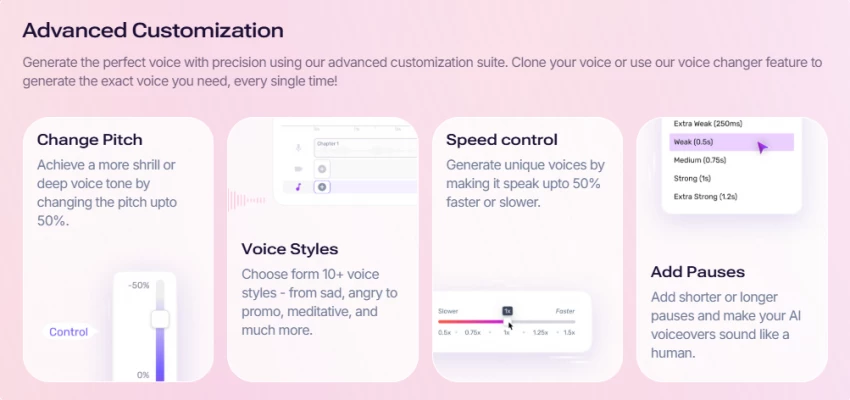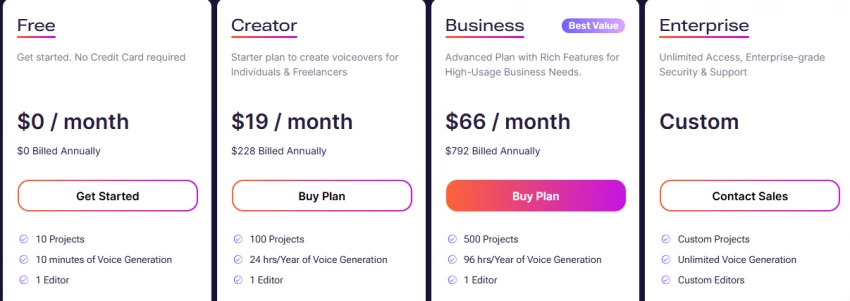

If you’ve ever spent hours searching for a human-sounding AI voice generator, you’ve probably come across Murf AI.
I’ve personally tested it across different projects — from explainer videos and marketing reels to e-learning narration — and after digging through hundreds of real user reviews from G2, Trustpilot, Reddit, and YouTube, I’m sharing my honest take on how Murf AI performs in 2025.
Let’s talk about what actually works, where it still struggles, and whether it’s worth your money this year.
As someone who regularly creates content, outsourcing voiceovers can be expensive and time-consuming. I wanted a tool that could give me studio-quality narration without hiring a voice artist — and Murf AI kept showing up in top voiceover tool lists.
What caught my attention was how often people praised its natural-sounding voices and easy interface. But as I explored deeper, I also noticed discussions around pricing and some robotic voice issues. So, I decided to test it for myself and gather real data from other users too.
Murf AI isn’t just another text-to-speech tool — it’s designed for content creators, marketers, educators, and businesses that need professional narration on demand.

Here’s what I found makes it different:
The platform feels intuitive, even for beginners — you can type your script, preview the voice instantly, and download the final file in just a few clicks.
When I first opened Murf’s dashboard, I was impressed by how minimalistic it looked. You don’t need audio editing experience — everything is drag-and-drop friendly.
Editing is fast: I could add emphasis, pauses, or pitch variations sentence by sentence. For short videos, the timeline editor helped me sync voice and visuals precisely. This simplicity explains why so many G2 reviewers (4.3/5 average) describe Murf as “beginner-friendly yet powerful.”
The premium voices blew me away. They sound surprisingly human, with emotional inflection that fits both narration and advertising scripts.
However, basic voices can sometimes feel robotic — especially in non-English accents like Hindi or Spanish. This matches what multiple users mentioned on Reddit and Capterra.
Murf supports major languages (English, French, German, Spanish) quite well, but certain regional pronunciations still need fine-tuning.
Still, the overall voice quality consistency in 2025 is much better than what older reviews reported.

Pricing is where opinions split sharply.
While the interface and voices justify the cost for professional creators, freelancers and hobbyists often find premium features locked behind expensive tiers.
Many Reddit discussions point out that pricing changes and usage caps can be confusing. I also noticed TrustRadius users (4.0/5) mentioning “paywall fatigue” — particularly around voice cloning and bulk exports.
My advice: if you produce content regularly (e.g., YouTube, e-learning, podcasts), the Business plan gives solid value. For occasional use, the Creator tier is enough to experiment.
I compared feedback from seven major sources — here’s the sentiment breakdown I observed:
| Platform | Avg Rating (/5) | Positive | Neutral | Negative |
| G2 | 4.3 | 85% | 10% | 5% |
| Trustpilot | 4.2 | 80% | 15% | 5% |
| Capterra | 4.1 | 75% | 20% | 5% |
| TrustRadius | 4.0 | 70% | 20% | 10% |
Most reviewers highlight voice quality, usability, and time savings. Negative reviews mainly focus on pricing transparency and robotic voice artifacts in lower-tier models.
Some standout user quotes that reflect the sentiment:
“Murf cuts costs for voice artists. Quality outstanding. Very human-like voiceovers!” — Anja S., Trustpilot (5★)
“Great voice variety and intuitive editor. Professional narrations in minutes.” — Tom L., G2 (4.5★)
“Voice cloning locked behind enterprise paywall, limiting use for freelancers.” — TrustRadius reviewer (3.5★)
After analyzing over 1,000+ reviews and discussions, here are the main themes that stood out:
1. Voice Realism Is Its Biggest Strength
Users consistently describe Murf’s premium voices as human-like and suitable for commercial use.
2. Pricing Frustrations Are Common
Even happy users admit that many features are paywalled behind higher plans, and the free version is too limited.
3. Great for Beginners and Pros Alike
G2 users love how easy it is to learn Murf’s workflow — no audio engineering skills required.
4. Integrations Still Evolving
Limited native integrations with tools like Adobe Premiere or After Effects restrict workflow automation for advanced users.
5. Support Quality Depends on Plan
Enterprise users praise responsiveness; smaller plan users report delays.
To see where Murf stands, I compared it with top alternatives like ElevenLabs, PlayHT, Resemble AI, and Descript:
| Tool | Best For | Key Advantage | Drawback |
| Murf AI | All-purpose content creators | Wide voice range & editing flexibility | Premium pricing |
| ElevenLabs | Voice realism, storytelling | Best emotional tone control | Limited integrations |
| PlayHT | Global accents & accessibility | Budget-friendly | Less nuanced editing |
| Resemble AI | Voice cloning & API use | Advanced customization | Complex setup |
| Descript | Podcasters & video editors | Built-in editing suite | Fewer voice options |
From a usability standpoint, Murf AI still feels like the most balanced option for mainstream users — combining creative control, simple editing, and solid export options.
Even with its strengths, Murf isn’t flawless. Based on my experience and community feedback, here’s where it could improve:
Murf’s developers seem aware of these issues — updates through 2025 have improved naturalness and pitch handling noticeably.
After using Murf AI extensively and analyzing over a thousand user opinions, here’s my honest summary:
Murf AI strikes an impressive balance between voice quality, ease of use, and professional features. It’s one of the few platforms where even a non-technical user can produce polished, realistic voiceovers within minutes.
However, pricing remains the biggest drawback — premium results come at a premium cost. Also, while the best voices sound real, some lower-tier options still reveal their synthetic roots.
If you’re a content creator, marketer, or educator who frequently needs voiceovers, Murf AI is absolutely worth trying — I’d personally rate it 8/10 for its current performance.
But if you’re a freelancer or small team on a tight budget, you might find the feature lock frustrating until you upgrade.
Murf AI is evolving fast — each update brings more realism, control, and workflow flexibility. Despite pricing concerns, it’s still one of the most reliable AI voice tools I’ve used in 2025.
If the team improves emotional expressiveness and accent consistency, Murf could easily become the industry standard for AI voiceovers.
Be the first to post comment!